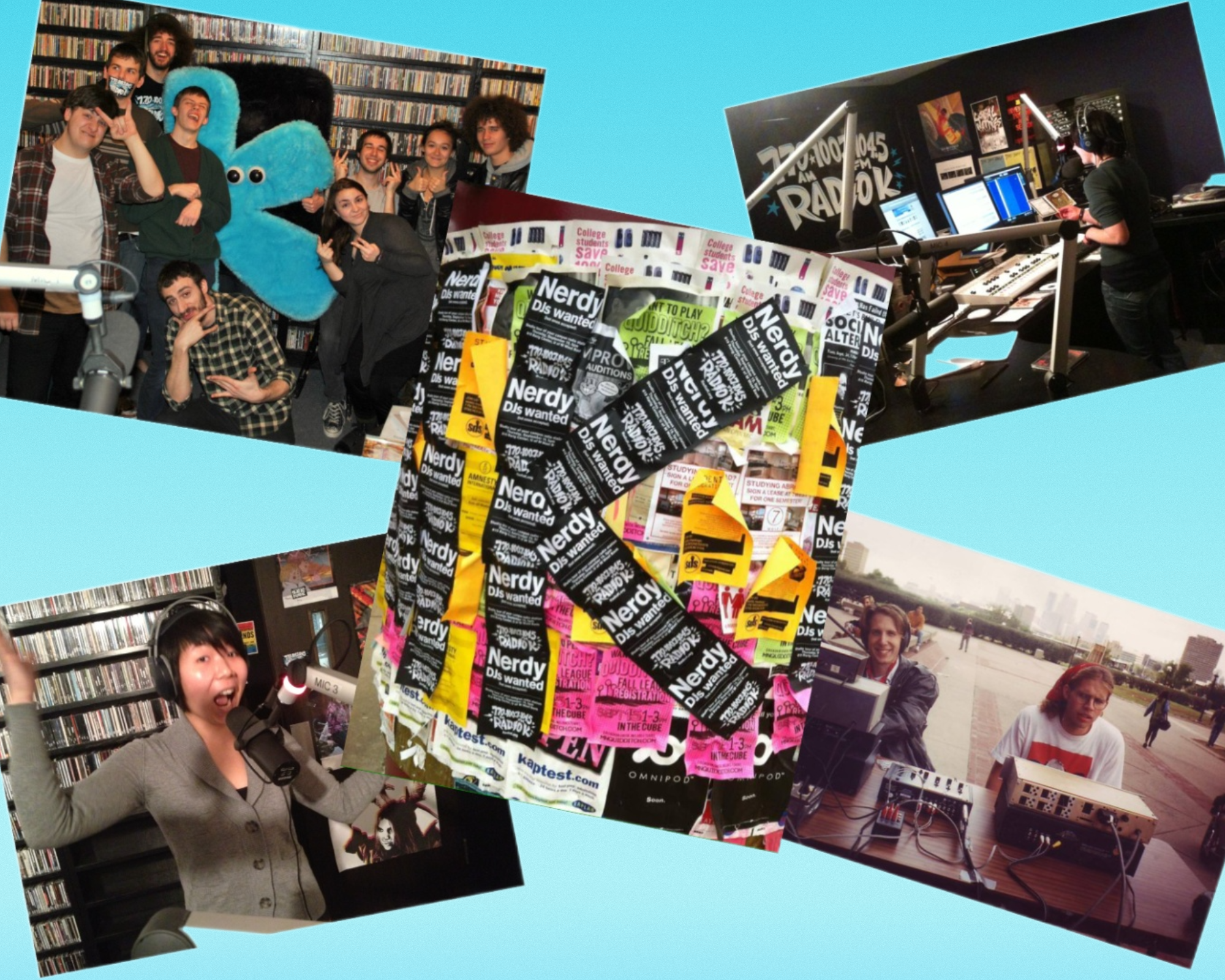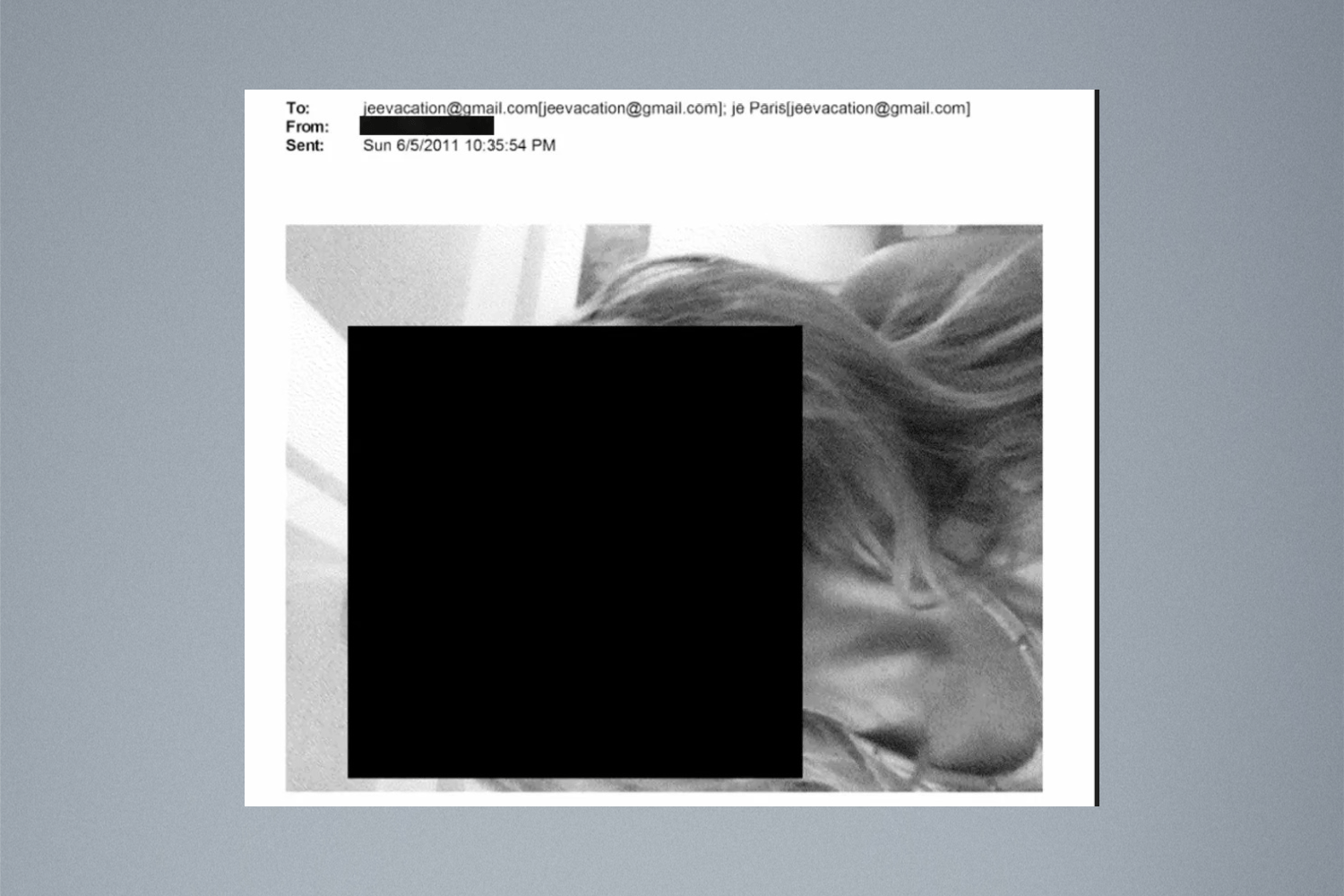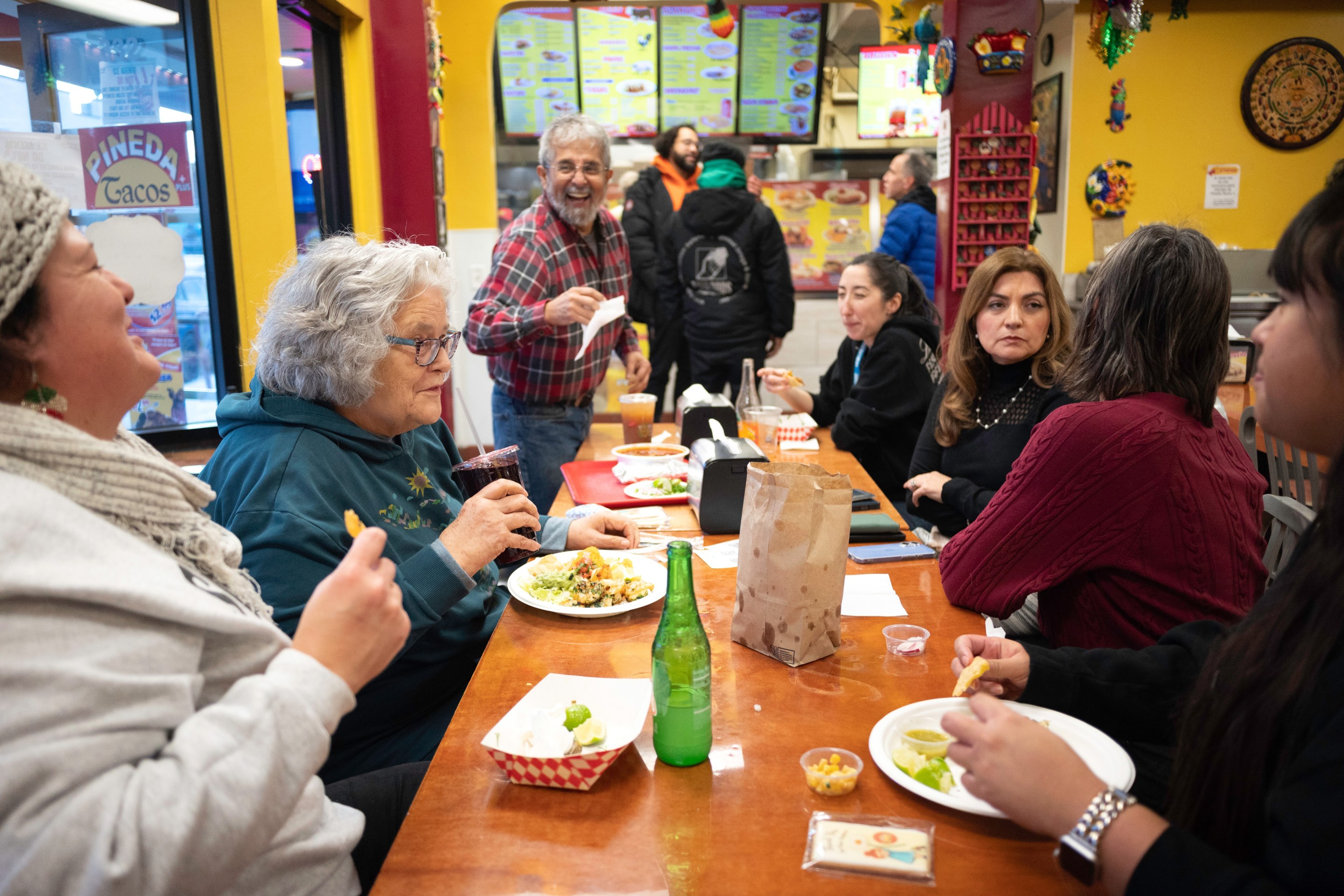Radio K can now drive, vote, drink, rent a car, and, soon, start prematurely worrying about baldness: The University of Minnesota’s inimitable student-run radio station is turning 30 this October.
We’re happy to report that the K appears to be in tip-top shape after three decades. Today KUOM, Minnesota’s first-ever and the country’s 10th-oldest radio station, is run out of its original Rarig Center home by 32 paid student staffers, three non-student managers, and over 600 age-spanning volunteers. The U of M foots part of the operating expenses, with grants and two annual member drives making up the rest. Students still choose all of the music—about half pre-determined by the music director, the other half chosen by individual DJs—and people are listening; Radio K’s Nielsen ratings from April '22 compared to this past April are up 131%.
How’d Radio K become the country’s premier college frequency and, for our money, the best station in town? Let’s hear from the music-loving Twin Citians who made it possible over the years.

The Beginnings
Jim Musil, founder and programming coach, 1993-1998: There was a station that has its own colorful history called WMMR. It was a campus-only radio station run by students. They had audio wires running to each of the dorms, and then a special transmitter in each of the dorms that would actually broadcast a signal over the electrical wires in the building. A ton of really influential radio people in the city passed through, including Garrison Keillor. They were just learning how to be broadcasters. That’s where I started, as a freshman in ‘88.
Simon Peter Groebner, DJ, 1993-1999, to City Pages in ‘94: In the '80s, I think campuses might have held more secrets of the culture. But after all the corporate co-optation recently, we don't have much left of our own. I know this whole idea of a campus community is kind of corny, but it just seems that Radio K has been the most successful at rebuilding that mythical idea.
Jim Musil: In the early ‘90s the U had a budget problem. This is around the time they turned one of their campuses into a prison. One of their budget-cutting targets was KUOM, which at that point was an employee-run classical and news music station. It’s the oldest frequency in the state. I put together a proposal, and pitched to various people: Hey don’t sell that, let’s hand it over to the students and let them have a show. And that’s what happened. That happened in ‘91, and we finally went on the air in ‘93.
Andy Marlow, station manager, to the Twin Cities Reader in ‘96: It was a pretty tense period. Nobody knew quite what to expect. When we began, I was comfortable with about 30% of the music—I'm 52 years old, not exactly the demographic we're aiming at—and I'm up to 80% now.
Jim Musil: I was just a student. I didn’t know exactly what I was doing; I knew the idea was right, so I put together sort of a semi-professional looking proposal. We just found a way to find money—support from KSTP’s Stanley Hubbard, the student union, money from the Corporation of Public Broadcasting. We had a small staff from the [since-merged] old station [WMMR] and hundreds of students. There was some fun to be had there. I handled the first broadcast. The first song was the Ramones’ “Do You Remember Rock and Roll Radio?” I think I said something like, “The oldest station in the state just became the newest.” It was pretty exciting, thrilling. Broadcasting to the dorms before, you’d be lucky if you had 10 listeners at a time.
Danny Sigelman, music director, to the Reader in ‘96: We're a bunch of radio geeks. I don't know... [we play] whatever's good. Personally, I don't listen to those [other Twin Cities alternative stations like REV 105 and 93.7 the Edge] at all—I've never heard Silverchair!
Ali Lozoff, marketing manager, to the Reader in ‘96: Our entire operating budget is probably what REV and Edge spend on just advertising. We can't really compete with them on that level, so we have to get our bumper stickers everywhere, work with clubs to get our banners up, work with bands to keep our name going. We'd like to be more involved when people discuss alternative radio in town; sometimes it's just REV vs. Edge—a Coke vs. Pepsi debate, and we're like RC Cola.
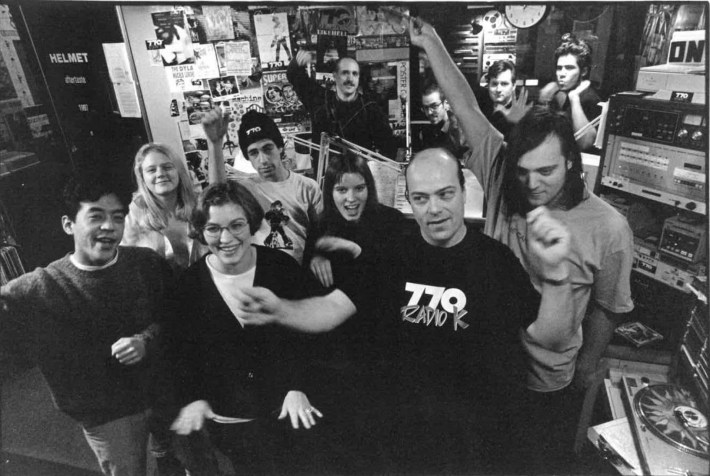
Simon Peter Groebner to the Reader in ‘96: I don't like the idea of every radio station or TV station reflecting a national, homogenized culture. In this town, Run Westy Run is just about as big as Green Day. Fundamentally, we play local music because it's great. We're not trying to be obscure. We're trying to have as many listeners as we can.
Jim Musil: It was a hit. It was limited by the fact we were on AM, playing music that people were used to hearing in high fidelity, and we had to sign off at sundown. That whole group has a tremendous amount of pride in what we accomplished.
Mike Neuharth, DJ, to the Reader in ‘96: I've been pretty ugly today—I've screwed up a couple times. Maybe people are pissed at me.
Brian Oake, Radio K and REV 105 DJ, to the Reader in ‘96: For college radio, I felt like it was an ideal situation. The freedom we had was pretty exciting—to be able to play Ministry on a morning show, that was great. I'd never been deeply steeped in the intricacies of radio, and [Radio K] was a great training ground [for REV].
Kevin Cole, REV 105 program director and KUOM alum, to the Reader in ‘96: They do an awesome job, but it's a hard job as well. I almost feel like they're our sister station... The REV offers more consistency, a more professional approach, and it's in FM stereo... Radio K has a lot of different goals. You never know what you're gonna get.
Mike Helget, program director, to the Reader in ‘96: We're facing the grim reality of a future without CPB funding, and we have to look at other avenues. We don't want to have to ask listeners for money... but if it means keeping the station in existence, like it or not, we're gonna have to.
Simon Peter Groebner to the Reader in ‘96: I hope we haven't let go of the fact that it's fun. All the [alternative radio] singers seem to be moaning now. One way we choose the music we play is if we put it on and it makes us grin stupidly.
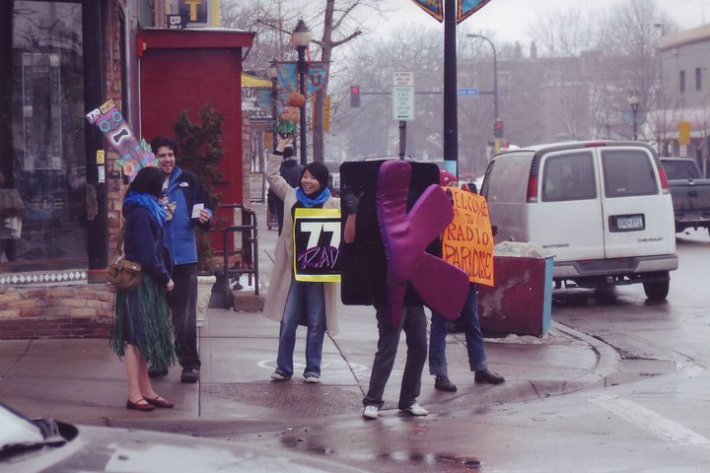
First Impressions
Sara Miller, director, 2009-current: When I moved to Minneapolis in 1991, I immediately realized how cool Radio K was and how important college radio is. I just love it. That’s a stupid answer, but I love and respect it. If you met somebody and they said they loved Radio K, you knew you’d be best friends: We have similar this, similar that, let’s go party.
Mark Wheat, programming coach and DJ, 1998-2004: I came to the Twin Cities in ‘92, and started DJing at KFAI in ‘93. I was doing the local show, which is kinda crazy, being a Brit. Simon and Danny were doing Off the Record, the local show at Radio K, so I used to listen to them all the time. As a college radio station, it was as good as it could be: It had already built a national prestige.
Ali Elabbady, DJ and producer, 1998-2006: I was walking across the Washington Avenue Bridge, and I got handed a flier for The Beatbox on Radio K. I was like: “Wait, we have a radio station on campus?” I was influenced by Casey Kasem and Tony Fly back in the day, and there wasn’t really a radio role model from a SWANA/MENA perspective. I filled out a volunteer application, everybody goes through the same ritual: You go to Lois at the front desk inside Rarig Center, she gives you the application, you write down your interests, and by god, they’ll find something for ya.
Christopher Matthew Jensen, DJ, producer, and engineer, 2005-2007: I’d been listening to Radio K for a while, and wasn’t thinking of it as an option of something I could do. Once, while working at Erberts & Gerbert's, I delivered a sandwich there, looked around, and thought: “This place is amazing, why am I not spending all my time here?” I ended up being the guy who kinda did a little bit of everything. I think Radio K was probably the most direct skill development I got for my eventual career—you learn really meaty skills.
Sarah Darnall, office manager and DJ, 2009-2012: It was a very fun, supportive, creative, sweet environment. A goofy place, but also very pro. I always felt like I didn’t know nearly as much as everybody else who worked there.
Jackie Renzetti, producer and DJ, 2013-2017: I remember being a freshman and seeing these black and white posters that were all over campus, that were like, “Nerdy DJs Wanted.” I was like, yes, this! Any student can become a DJ, you just have to do 10 volunteer hours and take a training class.
Julian Green, DJ, training director, and program director, 2018-2021: I worked at a grocery store, Pick ‘n Save in Milwaukee, when I was a sophomore in high school. I had the same [deep] voice as I do now, just with more cracks and stuff. I liked to work in the morning at those kinds of jobs, and who shops in the morning? Old people. And immediately, probably five times per day, they’d say I should sing or be on the radio. I had no desire to sing, but that radio thing stuck with me. As soon as I got to campus, I signed up.
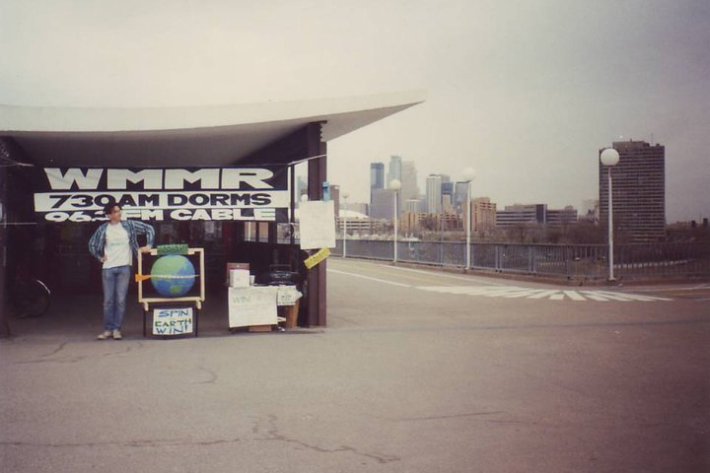
Sense of History
Christopher Matthew Jensen, DJ, producer, and engineer, 2005-2007: Once I started volunteering there, it was like that’s all I wanted to do all the time. I immersed myself pretty quickly in the history.
Sarah Darnall, office manager and DJ, 2009-2012: I started noticing Radio K stickers, signs, and sponsorships around town and at shows, and I realized it was way more than a kinda fun job I could have on campus.
Jackie Renzetti, producer and DJ, 2013-2017: It had a clear organizational identity. There are just tons of posters all over the station, of all these shows going back to the ‘90s. It just felt like a fun environment where they still did real things.
Julian Green, DJ, training director, and program director, 2018-2021: I had no conception of it beyond what I saw. Immediately I could tell this is where you can find people who are into more niche, alternative music. It was really an oasis from everything else the university is/was to me at the time–football, Edina, frats, stuff like that. Radio K seemed like you could meet people and express yourself.
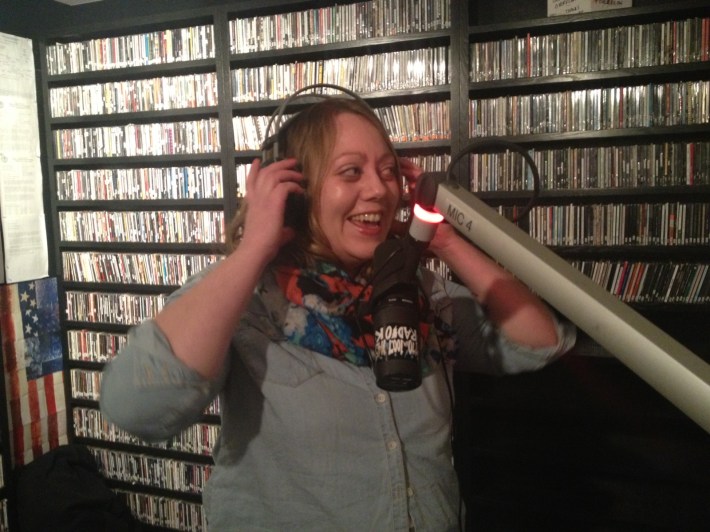
The Health of the Station
Sara Miller, director, 2009-current: We got a website, and then we started streaming. We were always so creative in finding ways to do things that don’t cost a lot of money. We had a little PC next to our DJ booth that would run our stream, and you know it would go down all the time. It wasn’t necessarily approved by the university. When we got our first FM signal in 2002, that was a huge freaking deal. And it was a timeshare with St. Louis Park high school. We were in tears, we were so excited. That was major. I had goosebumps. It was six watts, a teeny-tiny, itsy-bitsy antenna for 106.5; but she’s powerful and she has served us well. The 100.7 and 104.5 came in 2009, and they’re what’s called an AM translator, and they’re at 99 watts each.
Ali Elabbady, DJ and producer, 1998-2006: This was just the start of the online boom. That’s when I started reading Pitchfork, not knowing that [Pitchfork founder] Ryan Schreiber had started at Radio K. The music they played wowed me and fascinated me—the independent spirit, letting your freak flag fly, giving shine to local music. It made me want to know my city better. Special shoutout to someone who doesn’t get enough shine but deserves all the credit: Larry Oberg, who’s basically the technical equipment manager.
Christopher Matthew Jensen, DJ, producer, and engineer, 2005-2007: I got there at a really interesting time. I knew about The Current coming into being, and I had read Radio K program director Mark LaCroix in Pitchfork Media talking about how it affected Radio K. I got there right after that happened, and it felt like it was kind of a new day.
Jackie Renzetti, producer and DJ, 2013-2017: We would help submit grant applications, but we never really had an idea of how much money we were asking for. It seems stable, but we didn’t know any details. Our pledge drives were always successful; we always hit at least 30K.
Julian Green, DJ, training director, and program director, 2018-2021: Of course March 2020 happened, and a lot of people were graduating like the program director Darby Ottoson and the music director Maddie Schwappach. Since it was such a turbulent time, they didn't really open up applications to be the program director. One of the station’s managing directors just called me and asked me to take the job. They made you feel like you could do it. Everything seemed really DIY yet smooth.
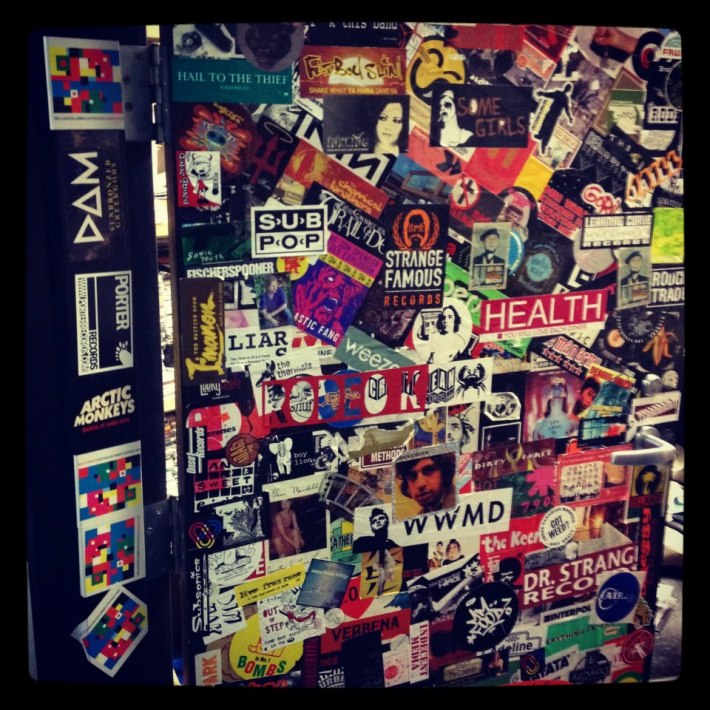
Exciting Bands of the Era
Jim Musil, founder and programming coach, 1993-1998: I’m not the best DJ, but when I did DJ, I would be taken to task for always playing Built to Spill. I’d probably play the same songs a lot [laughs]. Cloud Cult was really popular.
Mark Wheat, programming coach and DJ, 1998-2004: Yo La Tengo have always been favorites of mine, and they’re a great example of a band we revered whose attitude was in line with ours. Low, looking back at the career they’ve had is spectacular; we had some intense sessions with them. The local scene was important to us, Lifter Puller was having a moment when I got there. Dillinger 4 sessions were insane. Mason Jennings supported the station big time, as did Cloud Cult.
Ali Elabbady, DJ and producer, 1998-2006: I’ll never forget the first time we played Atmosphere’s “Woman with the Tattooed Hands.” Slug dropped it off at the station, and we handed him a six-pack of Newcastles. It was so popular we played it twice—once at noon, once at one. It was a sea change for Rhymesayers.
Christopher Matthew Jensen, DJ, producer, and engineer, 2005-2007: I remember when Gnarls Barkley released the single “Crazy,” it felt like a watershed moment. They had this indie credibility, we had been playing Goodie Mob and Danger Mouse, but they were literally No. 1 on the pop chairs. It was like, “KDWB is playing this… should we really be playing it on Radio K?” I think the music director kinda held a vote.
Sarah Darnall, office manager and DJ, 2009-2012: I loved Warpaint. Sylvan Esso was just kind of starting. I was super obsessed with… was it James Blunt or James Blake? James Blake!
Jackie Renzetti, producer and DJ, 2013-2017: I hosted Off the Record, so some of the local bands I remember are Tony Peachka. Loved Tony Peachka, oh my god. We really liked this band BOYF, and a band called Graveyard Club. More mainstream, the ones that stood out to me are Vampire Weekend; we all loved Modern Vampires of the City. They were big. Around the same time: Courtney Barnett, Beach House with Depression Cherry, Tame Impala. This is purely a theory, but it seemed like Minneapolis had a pretty unique following for the band Whitney; the Radio K staff was really into them, we were pretty excited for the in-studio. And then there are the cliched staples like Wilco, Pavement, Velvet Underground, and Yo La Tengo.
Julian Green, DJ, training director, and program director, 2018-2021: There was a big shift. The person who was the music director at the time when I first started, they played a lot of punk and indie rock. As I joined, and as Maddie became music director, I noticed things getting added to the library that weren’t really in that vein—R&B, electronic, more things by women. One of the best parts of joining Radio K was just discovering so much music. Ariel Pink, Alice Glass, Tennis, Beach House, the hilariously obscene rapper Sahbabii, a bunch of really cool local bands. During my original shift, there were programmed songs you had to play, but I was never mad because everything, old and new, was cool. One of my favorite things, when I took a 2-4 a.m. solo shift on purpose, I’d just raid the back closet music library—it was ordered basically 1993 to present. You could find 3 Feet High and Rising by De La Soul, Stankonia, Spongebob Original Soundtrack, all this vinyl like Todd Rundgren who I had never heard before
Sara Miller, director, 2009-current: I was a college student in the ‘90s, and now it’s cool to play ‘90s music again. And the students will also be like, “Oh my god, my dad loves Vampire Weekend,” And I’m like, “Oooooooh boy. I could be your parent.” The students turn over a lot because they graduate, so we’re always 21, as a general rule.
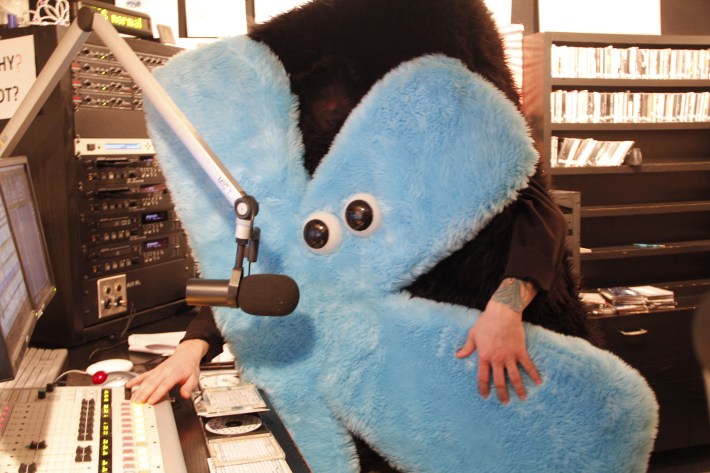
Unfortunate Bands of the Era
Jim Musil, founder and programming coach, 1993-1998: Somehow we were playing… I can’t even say the name… like, the Cherry Poppin’ Daddies was a band that everyone seemed to love. It seems really dumb now [laughs].
Mark Wheat, programming coach and DJ, 1998-2004: There are probably so many I’d chuckle at if I looked back at my old playlists… we went through a big phase of supporting Swedish bands, none of whom went on to any prolonged success at all [laughs].
Ali Elabbady, DJ and producer, 1998-2006: One of the records that didn’t age well, and we definitely gave it some airplay at the time, was the Pizza Boys. Their album was called Double Agent Dork Breath. It was super filthy, tongue-in-cheek hip-hop. It was definitely one of the more memorable records [laughs].
Christopher Matthew Jensen, DJ, producer, and engineer, 2005-2007: There was definitely some crap we played that was in rotation, but what am I gonna do? You gotta play what’s on the docket. There was this band called Chicks on Speed, and they were like a very DIY, ramshackle, almost Shaggs-esque act. If you weren’t into it, it sounded awful. I remember at the time thinking, “This is actually kind of awesome because everyone hates it!”
Sarah Darnall, office manager and DJ, 2009-2012: There was that band that was so huge… they had that hit that was everywhere… Foster the People! “Pumped Up Kicks” was blowing up, and I remember when it crossed over to Top 40. I remember telling my sister, “Woah, this was kind of a smaller band we’d play at the college radio station.”
Jackie Renzetti, producer and DJ, 2013-2017: Well Har Mar Superstar got canceled…
Julian Green, DJ, training director, and program director, 2018-2021: I’m not really a guilty pleasures kind of listener. I would play, like, the Teen Titans theme song… I’m pretty sure “Ripped Pants” by Spongbob was the last song I ever played as a student.
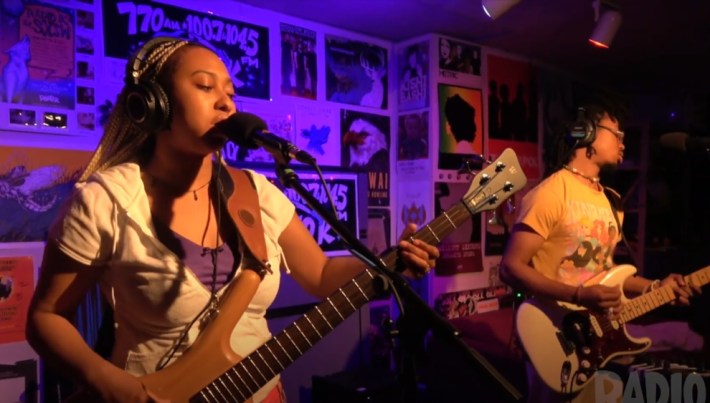
The State of the Local Music Scene
Jim Musil, founder and programming coach, 1993-1998: Tapping into the local music scene is one of the things I’m most proud of. Simon and Danny started the Off the Record Show, which has been a mainstay for a long time. One of the assets this old radio station had was a pretty amazing recording studio—20-by-30 room, all soundproofed and ready to go, with a big board. We were able to have a lot of live bands. If you go in there now, the walls are just covered with photos of bands who have passed through.
Mark Wheat, programming coach and DJ, 1998-2004: Looking back, it was burgeoning at that time. Around the turn of the century the type of music Radio K played started to go mainstream. I was so in awe and enamored with the local music scene, and felt like it was credible and the people in it were in it for the right reasons.
Ali Elabbady, DJ and producer, 1998-2006: It seemed like we were doing something small at the moment, but right when it hit you could see the energy in the city; you’d see the phones ringing off the hook, asking, “What was that you just played?” You got to see the rise of Rhymesayers, Heiruspecs, the early rise of Doomtree. That’s how I literally got to know the music scene. There were so many pockets you could catch it. You could go to the 400 Bar, the Triple Rock, the Dinkytowner. You saw so many up and comers in the hip-hop scene, like P.O.S or Mike Mictlan.
Steve Barone, Lifter Puller guitarist and ‘00s-era City Pages advice columnist, via CP in 2002: It's college radio. All you need is indie cred. Here's what you do: Listen to what they play and compare the music to your tunes. If it doesn't relate, STOP HERE. If you see yourself fitting in, recognize that we live in a small town with a very incestuous music scene, which is fragmented into little mini-scenes that are defined by bars and the bands that play in them. The majority of local bands that get airtime on Radio K play in the Turf Club-Entry-Big V's-Dinkytowner scene. Start hanging out in these places and stand next to me. Duh.
Christopher Matthew Jensen, DJ, producer, and engineer, 2005-2007: It felt like it was about to explode, to be honest. I got to meet and become friends with a lot of my favorite local bands. There were a lot of bands that were signing indie deals, but indie was now the thing. Modest Mouse was on the pop charts. It seemed like every time a band locally, like Chooglin' got signed to Fat Possum Records with the Black Keys, there was this optimism and excitement that it’d pan out for everybody. I think that was because internet marketing was relatively new, and it was possible to go from small to big without the blessing of the industry. Weirdly, I felt like it didn’t happen in Minneapolis. There was all this talent, and everybody kinda had some successes, but there wasn’t this commercial breakthrough at an international level. Tapes 'n Tapes signed to XL, and it felt like the Minneapolis scene was on the come up. It seems like there was a little bit of a lack of payoff.
Sarah Darnall, office manager and DJ, 2009-2012: It was amazing. At that time there were just so many places to play and see music, whether it was an official venue or not. I feel like we all remember The Medusa or Glitter Box or house shows that weren’t totally sanctioned.
Jackie Renzetti, producer and DJ, 2013-2017: It did seem really healthy, thriving, and busy. My job for Off the Record was assembling a playlist every week, and also highlighting shows. We never ran out, and we didn’t have many repeats. We didn’t have any problems finding exciting local bands.
Ross Koeberl, music director, to the Star Tribune in 2016: I went to a lot of shows this year that didn't have any all-male, four-chord, third-rate guitar-rock bands on the bill. It was a year for audacity, for young artists to work collectively toward great musical aspirations. It kept me on my toes all year, and it's made me feel very fortunate to be a part of that landscape.
Julian Green, DJ, training director, and program director, 2018-2021: A big part of volunteering was just going to local shows and checking out venues. I would have never gone to the Triple Rock if it wasn’t for that. Just the Off the Record sessions with local artists, just being around young people who are into music, you’re going to house shows. It was so much more vibrant than where I was from, Milwaukee. There was so much more infrastructure. The scene is a bit more conscious and a bit more politically aware, just because of how much we’ve been through as a city since 2020 and even last weekend [with the Nudieland shooting].
Sara Miller, director, 2009-current: Because of the pandemic, having bands in for Off the Record–which I’ll note is the longest running local music program in the area–I think it has become even more precious and valuable.
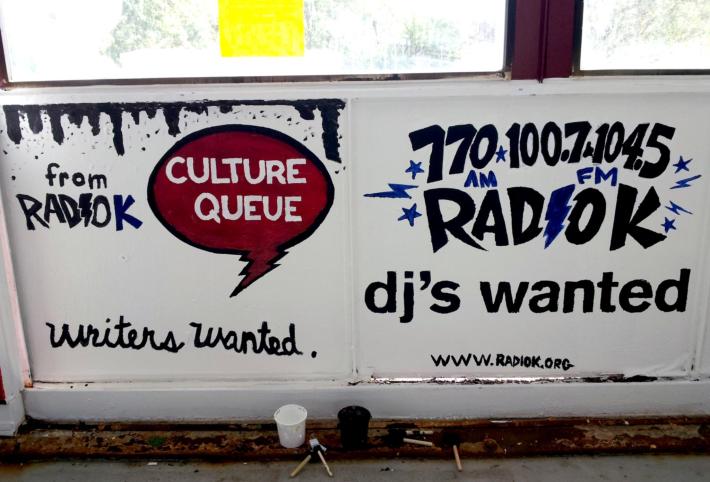
Goals
Jim Musil, founder and programming coach, 1993-1998: I think our slogan at the time was, “Real College Radio”... it might have persisted to today. We wanted to be taken seriously as broadcasters, not just a patchwork of various sounds.
Mark Wheat, programming coach and DJ, 1998-2004: I remember raising funds to take the kids to South by Southwest and the CMJ in New York. Trying to raise the profile of the station. Obviously the internet started becoming a big thing while I was there, and we started streaming pretty early so people could hear us all over the world. The students ran the station, and giving them as full of an industry experience was the ultimate goal.
Ali Elabbady, DJ and producer, 1998-2006: I wanted to be one of the first SWANA/MENA voices on air. It provided that launchpad, and it’s something I’m forever grateful for. We really utilized RadioK.org for donating via the web. It helped reach impassioned listeners who had moved away. You see it everywhere now, but back then it seemed like Radio K was one of the firsts.
Christopher Matthew Jensen, DJ, producer, and engineer, 2005-2007: The big thing was the rebrand. We used a different tagline—”Where Music Matters Most” came out of that era—and the blue logo. And we also overhauled the live performance studio.
Sarah Darnall, office manager and DJ, 2009-2012: I don’t know if it was ever outwardly said, but we were just trying to make the presence of the station better known. More accessible to people who maybe don’t consider themselves quote-unquote music people or scene people. How do we let the campus and community know we’re here? And honestly, just making sure the signal was stronger and reaching into the metro.
Jackie Renzetti, producer and DJ, 2013-2017: Our goal was essentially to keep the station going. Not in a status-quo way, people were trying new ideas here and there, but I got the impression that it’s, “Here's this thing people have built, it’s your job to keep it moving.
Julian Green, DJ, training director, and program director, 2018-2021: A big part of Radio K is just making sure it’s there for the next generation, that it doesn’t get overrun by the university bureaucracy and remains a student-run station. You feel a sense of ownership with it. It’s one of the few student-run stations that still exists. So going hard for pledge drives; during a pledge week, people almost live at the station… well, people almost live at the station in general because it’s such a welcoming, fun environment. During my time at Radio K things also got a lot more diverse, because of the work Maddie did and the work I did with my specialty show called Soul Food, which was about showing Black music from across genres and time. It wasn’t all punk and indie music from straight white dudes.
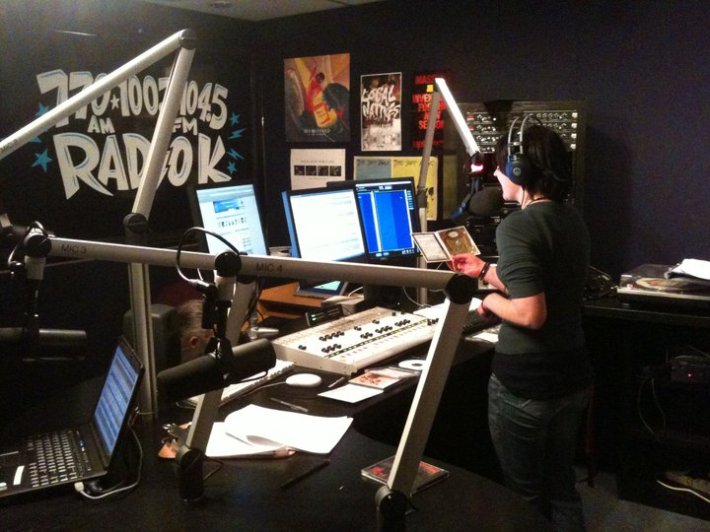
Challenges
Jim Musil, founder and programming coach, 1993-1998: People were mainly worried we’d break some FCC rule. Not so much swearing, but, like, “Hey you can’t turn up the transmitter wattage to whatever you want!” It was like my other education.
Mark Wheat, programming coach and DJ, 1998-2004: I distinctly remember when 9/11 happened, while I was at the station. We had to help the students know how to address that on air. And then there are the fundraisers; asking for money on air is the toughest thing you can do. I personally love fund drives, but I know that’s not universal.
Ali Elabbady, DJ and producer, 1998-2006: There was a real lack of hip-hop radio in the Twin Cities at the time, and it’s so disheartening that hasn’t really changed. I hope that Carbon Sound becomes bigger; it really deserves that, and we desperately need something like that. As specialty programs started going out the window, that really signaled the end of an era. The specialty programs on the weekend were like the best things about Radio K. They were the heart and soul of the station, exposing people to subgenres, for almost a decade. They started to become a more Pitchfork-oriented station, but I really don’t hold that against ‘em; you have to know your audience.
Christopher Matthew Jensen, DJ, producer, and engineer, 2005-2007: Not having the runway to figure out who the station was going to be in this new era. The Current had come along, and changed the market a bit. Radio K knew it had to reestablish itself and confirm who we are, what we do, and what do people turn to us for. It seemed like there was this pressure that we had to do something—and quick. Otherwise we were going to fade away, because there’s this new player and they’re going to eat our lunch. And we had to raise money, and there was this worry that our donations would fall short because they’re now going to MPR.
Mark LaCroix, program director, to Pitchfork in 2005: "[Former Radio K staffers Steve Nelson and Thorn] hadn't told us [they accepted the jobs at The Current], and were serving on our advisory board at the same time. So we felt—not like they'd gone behind our back—but that it was a little shady. What I've noticed listening to [The Current] is that I recognize every song. At the same time, in any three hours of Radio K, there's a good chance that I'm not going to recognize a full hour of it. And that's part of its charm. [But] oh yeah, absolutely… [The Current] is good news for some of us students because as soon as we graduate, we are cut off, we're no longer allowed to work here. It means that we've got a place to apply.
Andy Marlow, longtime station manager, to Pitchfork in 2005: [MPR] has this long track record of essentially trying to be all of public radio for the state. They've really encouraged and promoted that idea, and anybody who calls themselves public radio and is not part of MPR, they don't particularly appreciate."
Sara Miller, director, 2009-current: A lot of our students get internships across the river at Minnesota Public Radio. They’re our better-looking bigger brother, but we’re the foxier younger sister, if you will. The Current is where a lot of people go, because it’s the premier public radio music station in the country. It’s really true. There’s a synergy between the stations.
Sarah Darnall, office manager and DJ, 2009-2012: I don’t remember if I DJed for one semester or two, but that was a huge learning curve. Physically being in the studio and being like: “Oh god, what am I going to play next? Do I have it? Can I find it? Is it going to work? What is going to happen if it doesn’t?” It was fun, you get hyped up and nervous but it just flies by. I felt like I’m not cool enough or knowledgeable enough, but they told me I could so… here I go! I was like, “Oh, I just work in the office, I’m not going to sign up for DJ training…” And they were like, “Why? You’re here; do it.”
Julian Green, DJ, training director, and program director, 2018-2021: Of course the big one was the Covid pandemic. There weren’t shows to review, there weren’t DJs in the booth, there weren’t bands coming in. I had the last shift where I got the call that, yeah, “We’re going full automated after this…” And then, just personally, I started at Radio K when it was not a diverse environment at all. We all liked the same sort of stuff, but I was still definitely the only Black person there for a while. There was never anything overt, but it was like, damn, I want more people to know about this.
Sara Miller: We were like, “Dude you’re done!” Let’s go to overnight and get the hell out of the building. It was really something.
Maddie Schwappach, music director, to the Minnesota Daily in 2020: Sanitizing 17,000 CDs is not really possible.
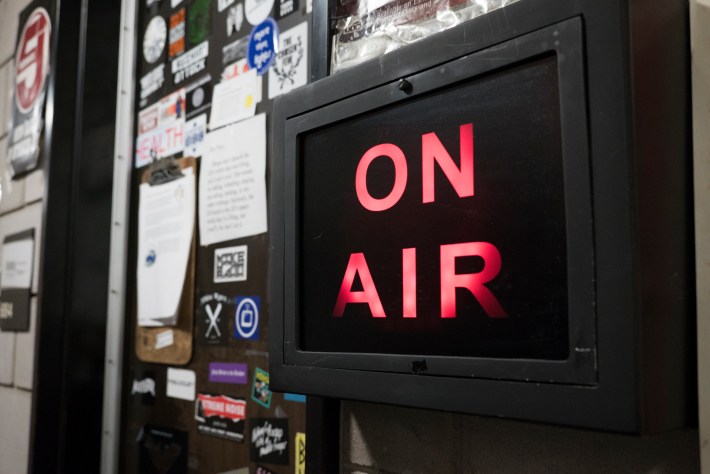
Listening to the Station in 2023
Jim Musil, founder and programming coach, 1993-1998: It’s been really fun to watch my children get into Radio K. That discovery time when you’re in your teens, and there’s a whole world of music out there, to see their excitement listening to Radio K… that’s a lot of fun to see. My daughter April will be attending the U this fall; she was part of Those Meddling Kids. We’ll see if she joins Radio K.
Mark Wheat, programming coach and DJ, 1998-2004: I have to admit I haven't tuned in for a very long time. That’s a personal thing. That’s me needing time to decompress because there were pressures in my former job that I wanted to step away from; I wanted to make sure that being a music-head and a radio guy wasn’t the only thing I can do in life. I’m sure they’re still doing a good job.
Ali Elabbady, DJ and producer, 1998-2006: Everything was like what I remembered when I came back to volunteer on a pledge drive. It’s still a vibe. I’d go into the CD library every day between classes, and make myself listen to five new CDs I’d never heard before. Radio K is about exploration. I hope it remains forever for people to discover their voices.
Christopher Matthew Jensen, DJ, producer, and engineer, 2005-2007: I still listen to Radio K probably every day. It’s my go-to for music. I react to it through the eyes of my kids, who are often in the car. I love having that perspective.
Sarah Darnall, office manager and DJ, 2009-2012: Going back as a musician [with the TikTok-famous band Hot Freaks] was so fun—normal, natural, what we should be doing.
Jackie Renzetti, producer and DJ, 2013-2017: I feel a lot of joy. It’s fun listening to the DJs, and you can hear their sense of fun emanating. I still discover new things through the station. I will add though, and I wonder if you can document this at all through your interviews, but I really think I’m hearing a resurgence of like actual classic rock, from the ‘70s and ‘80s, and I don’t know why. I want to know why!
Julian Green, DJ, training director, and program director, 2018-2021: I just get happy. Them doing their breaks, sounding a little awkward but still sounding excited. I just feel nostalgia, too. To the point where it can be a bit hard listening, because you miss that sense of freedom and discovery.
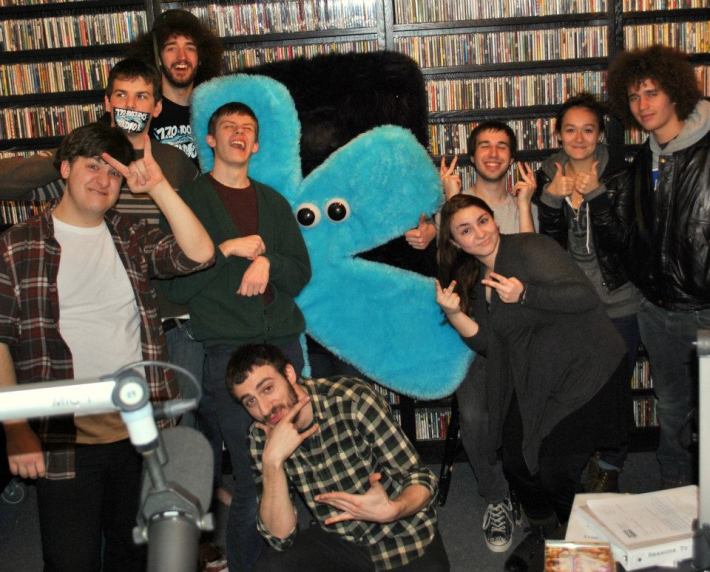
The Timeless, Incredible DJ Breaks
Jim Musil, founder and programming coach, 1993-1998: My favorite part of my programming coach job was just calling the DJ to give them tips: You could tighten up the break; try to pronounce it first before you say it [laughs]. Nowadays, I just want to hear how much the DJs like a band. The lack of professionalism doesn’t bother me as used to, back when we were trying to impress everyone with how seriously we were taking it.
Christopher Matthew Jensen, DJ, producer, and engineer, 2005-2007: When I hear a DJ stumbling, not knowing a band, or saying something that just doesn’t make sense… I love those moments, that’s a lot of the charm of the station. And now I watch my kids react to those moments; I love having that perspective. They let the kids really do it. I’ve worked with commercial stations a little bit, and you don’t have the option to screw up.
Sara Miller, director, 2009-current: That’s one of the magic ingredients in our success. Historically, audio is really personal—let’s go back to Roosevelt’s fireside chats. You get to feel like you know them. For our donations, we have a box that reads, “Everybody has a reason they listen, what’s yours?” People oftentimes will say we get so sick of the professional DJs, and they’ll name another public radio station across the river and maybe joke about something that’s not so nice, but that fuels our fire. We love them dearly, but it’s a good feeling to know we have our role.
Sarah Darnall, office manager and DJ, 2009-2012: I definitely feel nostalgia. It kinda makes me laugh too, listening to a DJ who’s fumbling or doing really well, you remember your own shifts. Nostalgia and, and I don’t know, pride? Like these kids are doing a really good job.
Jackie Renzetti, producer and DJ, 2013-2017: For me, personally, I just kind of struggled with knowing what I was doing [laughs]. You just learn on the job, which is super great. It’s supposed to be that way, and it’s a good experience to have. You have to go through the discomfort of doing something new. After two years I felt like a normal person on the mic, just talking casually.
Julian Green, DJ, training director, and program director, 2018-2021: Part of my work as training director was making people feel comfortable. Because it can be embarrassing to play a song that you like and wonder if people are gonna like it. We all have that experience of connecting that aux cord in the car, and people being like, “What the fuck is this? Turn it off”’ We called breaks an Oreo—the first cookie is what you just played, the second cookie is what you’re about to play, and the creamy middle is your personality. If you listen to an iHeart station, those DJs don’t really have any autonomy over what they play; I try to keep [the Radio K vibes] going to Carbon Sound.
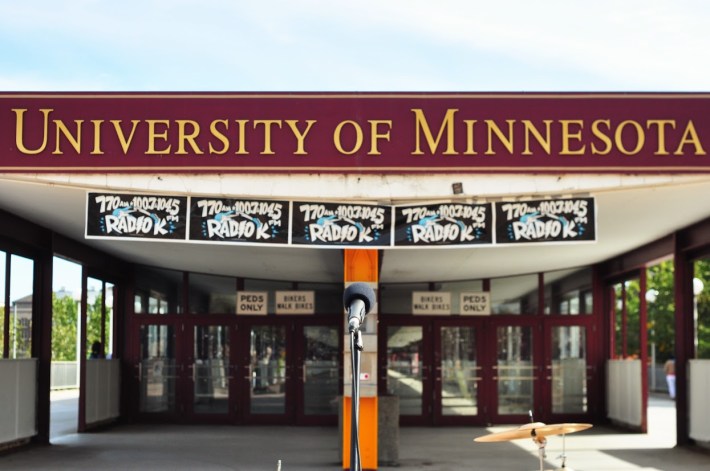
What Radio K Means to the Twin Cities
Thorn, DJ for Radio K and REV 105, to the Star Tribune in 2012: I'm a big believer in learning by doing. It filled a huge void as the U itself was moving away from teaching those sorts of hands-on skills, and it completely shaped my own musical tastes.
Mark Wheat, programming coach and DJ, 1998-2004: I hope it’s something the community can be proud of. I feel that it is. In the same way we celebrate First Avenue or Semisonic, Radio K should come up in that list.
Ali Elabbady, DJ and producer, 1998-2006: Radio K is the alpha, omega, and everything in between when it comes to the Twin Cities music scene. From Mark Mallman to, as much as I don’t want to mention him because he has fallen from grace, Har Mar Superstar, how much of a launch pad was it for artists like them? Being able to see them in their infantile beginnings, playing for an Off the Record audience, you got to see the bedrock beginnings. It’s still very much like that.
Christopher Matthew Jensen, DJ, producer, and engineer, 2005-2007: It’s like a vein, for somebody who can’t be as participatory in some things they love, like a music scene. It’s a way to let you tap into it. If you don’t know anything about local music, if you just listen to Off the Record like one time, you’ll know more than 90% of the people in the Twin Cities. If it’s important to you, it’s right there.
Sarah Darnall, office manager and DJ, 2009-2012: Radio K is a really awesome, accessible way to get your foot in the door of a music scene. Whether you’re playing in a band who wants to do an in-studio or you’re a student and you want to learn how a station runs. Or if you’re super lucky like I was and get to be on both sides of that.
Jackie Renzetti, producer and DJ, 2013-2017: Two big things come to mind when I think of Radio K: a) How it supports the local music scene; and b) The training experience you get. What it means to the Twin Cities music community? I hope people agree with me, and consider it this cherished resource.
Julian Green, DJ, training director, and program director, 2018-2021: Radio K is the incubator for artists, for personalities. It’s where you can learn about the music industry, and make connections that last for the rest of your career. It’ll give you as much as you put into it. All you have to do is really show up. UW Madison’s radio station wants to be like Radio K. A lot of other college stations do. It’s really special.
Sara Miller, director, 2009-current: KUOM, the big daddy which the university owns… thank god they’ve realized the value and kept it around. A lot of times, with these things that mean so much to so many people, they don’t realize it until it’s too late and they’re gone. The Minnesota Daily has struggles that I’m grateful we don’t have to deal with. It’s because music is magic, and Radio K is all about music–how can you fail? It’s an easy sell. It’s literally jaw-dropping Radio K is still around here 30 years later. God love the university, not only for apples and taking care of our pets, but also for bringing us radio.
Jim Musil, founder and programming coach, 1993-1998: I worry about it sometimes, like, “Is it going to carry on?” But we’re 30 years into it. Nobody knew what these kids were going to say. There was a lot of concern that this was going to be an embarrassment and sort of a liability. They run into challenges all the time but they keep finding ways to make it work. You’re only there for a little while, right? You contribute a little bit to it, and then you gotta move on, grow up, and live a real life. But while you’re there it’s so much fun.
Secondary sources:
- City Pages, August 17, 1994
- Twin Cities Reader, April 10, 1996
- City Pages, April 10, 2002
- Pitchfork, February 21, 2005
- Star Tribune, September 28, 2012
- Star Tribune, January 1, 2016
- Minnesota Daily, April 13, 2020
